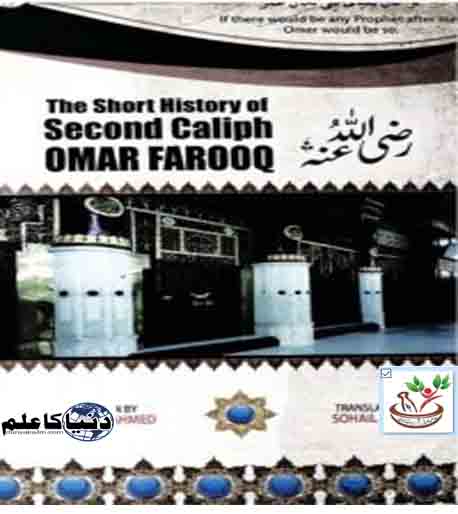The Short History of Second Caliph Omar Farooq [R.A]
By (Ishtiaq Ahmed)
Before assuming the charge of the caliphate Hazrat Oman was a merchant, but after becoming the caliph, he could not continue his trade. He gathered his companions and told them about his necessities. He asked how much he could get from the public treasury. Everyone suggested differently, someone said five thousand dirhams yearly, and others said ten thousand dirhams. Hazrat – Ali was silent, so Hazrat Omar asked his opinion. Hazrat Ali said, “I can give you permission for lower-grade meals and clothes.” Hazrat Omar liked his opinion. So Hazrat Oman and his family were allowed to have meals and clothes from the national exchequer.
Once Hazrat Omar was ill and the physician prescribed him eat honey. There was no honey at home and he had no money to buy, but honey was available at public treasury. Hazrat Omer came to the Nabwi Mosque and asked the people, “If you permit me, I get some honey from the public treasury?” Everybody permitted him happily. Hazrat Omer made it clear
with this example, only people have the right to the public treasury, and without their permission, no one can get anything.
![]()
After the conquest of Syria, Muslims established a friendly relationship with the Roman emperor. Once Hazrat Omar’s wife Ome-Qulsoom sent some bottles as gifts to Caesar’s wife, and in return, she also sent bottles full of gemstones as gifts. Ome-Qulsoome kept this gift with her when Hazrat Oman came to know; he at once reached. home and asked his wife to give him those precious stones, so that he could deposit them in the public treasury. His wife asked, “What is the concern of these diamonds with the public treasury?’ Hazrat Omar replied that he who carried your perfume bottles was a government servant, and you could not send this gift by the hands of a government servant. So it is unlawful and therefore jewels must be deposited in the public treasury. Ome-Quisoom handed over the diamonds to Hazrat Omar who deposited them at once in the public treasury.
On becoming caliph, he delivered a speech at a public gathering. Here is an excerpt from his speech: “People, if I knew that there was someone better than me for the responsibility of caliph, I would never accept the caliphate rather I would like to be killed.
![]()
When Hazrat Oman dismissed Hazrat Khalid bin Waleed, a man stood at once and said, Oman, Swear upon God, you did not do justice. You dismissed a commander of the Prophet: you covered the sword of Mohammad. You are cruel and did it due to jealousy just because he (Khalid) is your cousin. These harsh words were used for the second caliph in front of him, but Hazrat Oman neither punished him nor got angry. He just said, “You are angry just because he is your brother people used to count on him, and I feared that people might start thinking that they are achieving victories because of him (Khalid) rather than Allah.
![]()
On the one hand, people were not afraid of him expressing their sentiments and raising objections in his presence, on the other hand, in administrative issues, he was strong enough that he dismissed Hazrat Khalid bin Waleed at a time when people of Mesopotamia (Iraq) and Syria liked him very much, but nobody dared to do anything on his dismissal. Hazrat Khalid himself did not think wrong. Hazrat Ameer Ma’awia and Hazrat Omro bin Alas were senior companions,
but they did not dare against Hazrat Omar. Once a son of Omro bin Alas beat someone without any reason, he (the victim) went to Hazrat Omar for justice; Hazrat Oman immediately called his son. Omro bin Alas was also present there. Hazrat Omar gave the victim a lash and asked him to take his revenge, so he beat Omro bin Alas’s son with the lash, but the father could not utter a single word for his son.![]()
Jalba Ghosani was the ruler of Syria and embraced Islam. One day he was turning around the Ka’aba, and a man overstepped his shawl, Jalba slapped him, and in return, that man also smacked him; Jalba came enraged and came to Hazrat Omar. Hazrat Omar heard his complaint and said, “You got punishment for what you did.” Jalba was surprised and said, “We have dignity and high rank, if someone misbehaves with us we kill him.” Hazrat Omar said, “It used to take place during the age of ignorance before Islam, now Islam has ended all differences.” Jalba said that if Islam is like this, then I don’t accept it. And he went to Constantinople, but Hazrat Omar did not care about it.
![]()
Once all government officials were present, Hazrat Omar announced in the crowd that if someone has complained about him, please tell them. In this Governor of Egypt, Omro bin Alas and high other ranking officers were present. One man stood and said. “A ruler flogged me hundred times without any reason.” Hazrat Omar asked him to
get up and take his revenge. On this order, Omro bin Alas said, “My lord, every ruler will be discouraged with this approach. Hazrat Omar said, “So what, justice will take place.”
Hazrat Omer asked the man to take his revenge, that man took lash in his hand and got ready to do the job. At last Omro bin Alas made him agree to take dinars and compromise, so man agreed to do so.
![]() Once, leaders of Quresh came to meet Hazrat Omer, by chance, Hazrat Haseeb, Hazrat Bilal, and Hazrat Amaar had also come to see Hazrat Oman. These men were slaves before embracing Islam, and they were set free. Hazrat Omar paid attention to them first, so Hazrat Abu Sufian, who was s leader of Quresh before Islam, said, “It is the grace of God that slaves are allowed to get in, and we are waiting outside.” So one of them said, “Brother, it is true that we should complain ourselves not to Omar. Islam has removed the difference between poor and rich. These people among us accepted Islam first, so today they are in ahead of us.”
Once, leaders of Quresh came to meet Hazrat Omer, by chance, Hazrat Haseeb, Hazrat Bilal, and Hazrat Amaar had also come to see Hazrat Oman. These men were slaves before embracing Islam, and they were set free. Hazrat Omar paid attention to them first, so Hazrat Abu Sufian, who was s leader of Quresh before Islam, said, “It is the grace of God that slaves are allowed to get in, and we are waiting outside.” So one of them said, “Brother, it is true that we should complain ourselves not to Omar. Islam has removed the difference between poor and rich. These people among us accepted Islam first, so today they are in ahead of us.”
![]()
After the conquest of Qadseea, when Hazrat Omerit fixed the salaries of all companions and Arab tribes, some senior leaders of Quresh expected incomes according to their social status, and also their names were top on the list. But they were wrong, as Hazrat Omar preferred those who embraced Islam first, participated in Jihad, or were close associates of Prophet Mohammad. Omar fixed their salaries more than others, and there were slaves among them and they also got equal salaries, although before the advent of Islam, no one was downtrodden and oppressed more than slaves. Particularly, Usama bin Zaid, who was appointed as commander of an army by the Prophet, and then Hazrat Abubakar sent him to take revenge on those who were killed in the battle of Motah, Hazrat Omar fixed his salary more than even his son Hazrat Abdullah. Hazrat Abdullah could not bear it and said, I also did what he did, then why my salary is not equal? Hazrat Oman replied, “Ok, you are right that you were never behind him, but Mohammad always preferred him to you and thought him better. His (Hazrat Omar) own salary was fixed at five thousand dinars yearly because he also took part in the battle of Badar. This paltry amount was the salary of Hazrat Oman who was custodian of the revenue of billions of the Muslim state.
Hazrat Omar was strict not only with others but also strict with his children. One of his sons, Abu Shehma drank alcohol, Hazrat Omar
HAZRAT OMAR flogged him with 80 lashes with his own hands, and Abu Shehma died of this shock. Similarly, his brother-in-law, Qaran bin Fatoon also drank wine, and Oman also got him flogged with 80 lashes.
![]()
Hazrat Oman in days of battles used to visit the houses of soldiers (Mujahadeen) because they were not at home during wars. Hazrat Omar used to ask the family members of these soldiers if they wanted to get something from the market. These women used to send maids with him, and Hazrat Omar himself bought and handed over the provisions to these maids. And when letters came from battlefields, Hazrat Omar himself distributed these letters door to door to these soldiers. He also used to tell them when postmen will go back to the battlefields, and he sometimes used to sit there and write whatever these women asked to write for their loved ones. He did not like to write letters inside the houses but sit at the doorstep. He also used to listen to the people’s complaints and problems in the mosque. If he found no one there, then after waiting for some time he leaves the place. He used to stroll and patrol the streets of Madina at night. Read More…
Download (2MB)




